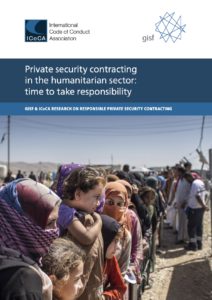FULL RESEARCH REPORT NOW AVAILABLE – ‘PRIVATE SECURITY CONTRACTING IN THE HUMANITARIAN SECTOR: TIME TO TAKE RESONSIBILITY’
Over the last decade, many have witnessed the increasing presence of private security providers (PSPs) in humanitarian organisations’ security risk management practices. Generally, contracted guards posted in front of compounds are the most visible manifestation of this, and have become part of the daily life of many humanitarian workers.
Yet, contracting PSPs often raises important doubts and concerns among the humanitarian community, particularly regarding the potential clashes with humanitarian principles and acceptance this practice can entail. Despite these concerns, there is little information available on how widespread these contracting practices are, and little discussion addressing the concerns contracting private security providers raises.
During the last six months, ICoCA and GISF have been working on a collaborative project to try and remedy to this knowledge gap. Through a joint research project on humanitarian organisations’ current private security contracting practices, our aim was to both shed more light on the issue and use the research findings to inform the development of practical guidance towards more responsible private security contracting. The research was composed of a survey and interviews with representatives of humanitarian organisations, mainly humanitarian NGOs.
The findings were first presented in a Webinar in October and served as the basis for an ICoCA/GISF policy brief. ICoCA and GISF are now glad to publish the full results of this study in joint report, Private Security Contracting In The Humanitarian Sector: Time to Take Responsibility.
This report highlights current trends, issues and challenges regarding private security contracting practices in the humanitarian sector and suggests key recommendations to improve them.
More precisely, it presents 5 core observations which were at the centre of most of the testimonies received during the study:
- Today, humanitarian organisations rely extensively on the services of private security providers, yet many humanitarian organisations are not equipped to make informed decisions when contracting PSPs.
- Low cost is frequently the main driver in the selection of PSPs, even though this approach can generate more risks for humanitarian organisations.
- Humanitarian organisations have limited awareness of and make little reference to international standards governing PSPs.
- Private security contracting entails major risks for a humanitarian organisation: it should imply a careful risk assessment, understanding its impact on acceptance, and effective mitigation measures.
- In many contexts, the working conditions of guards are often very poor. For humanitarian organisations, investing in relationships with their security providers is critical.
The report highlights the complexities involved in private security contracting, providing readers with a comprehensive understanding of the risks and opportunities it can present to humanitarian organisations. For instance, staffing choices can impact humanitarian organisations’ acceptance when they contact private security guards in certain areas. PSP staff themselves can bring risk to humanitarian organisations’ personnel. The study highlights the importance of mitigating the risks of sexual harassment and abuse by contracted guards.
Responsible private security contracting requires humanitarian organisations to undertake comprehensive human rights due diligence on their contracted providers, putting solid procedures and rigorous monitoring in place. ICoCA offers humanitarian organisations the most efficient and effective way to ensure rigorous human rights due diligence on private security providers. This is critical to both ensure PSPs don’t represent a risk for humanitarian organisations, but also because those have a duty of care towards their staff, the local communities, beneficiaries and contracted personnel.
This report, along with the accompanying Policy Brief, can be seen as a first attempt to open the discussion on the subject and as a basis for immediate action. While it also calls for more investigations involving a broader spectrum of humanitarian actors, there are concrete steps humanitarian organisations and their donors, should be taking today.
ICoCA and GISF hope this report will be of help to anyone involved directly or indirectly in private security contracting processes, or to anyone interested in the private security industry, its role in the humanitarian sector, and in the evolution of humanitarian security risk management.
A print version of the report is available here.

